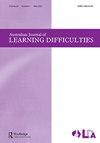Editorial
IF 1.6
Q3 EDUCATION, SPECIAL
引用次数: 0
Abstract
As the incoming editor of the Australian Journal of Learning Difficulties, I humbly thank Dr Wendy Moore for her leadership over recent years and for her tireless patience handing the baton over to me. I also gratefully acknowledge members of the Board of Learning Difficulties Australia for their faith in appointing me as editor of this journal which I believe has great capacity to reach a multidisciplinary audience. Ultimately, this broad lens best serves the needs of individuals with learning difficulties. Three articles are presented in this current issue including an empirical study from the 2017 Learning Difficulties Australia’s Eminent Researcher Award recipient, Professor Anne Castles, along with her co-authors; Drs Vince Polito, Stephen Pritchard and Thushara Anandakumar, all from the Department of Cognitive Science, ARC Centre of Excellence in Cognition and its Disorders at Macquarie University [Sydney, Australia] Castles and her colleagues investigated single nonword reading among 64 children who were in their third year of school. These children were divided into strong and weak readers based in previous testing. The authors found that the strong readers made fewer errors reading nonwords compared to the weak readers and further, errors made by the strong readers were more likely to be another nonword that was similar in its presentation. In contrast, errors made by weak readers were far more likely to be a lexicalization of the nonword. Castles et al., conclude that their findings lend weight to the view that strong readers continue to employ their knowledge of grapheme-phoneme correspondences to tackle words, which stands in contrast to the position held by some other authors that able readers are compromised by applying grapheme-phoneme knowledge. Castles and her colleagues also advocate for the use of nonword testing as a valid means of providing a deep insights into phonological decoding. Peter Westwood’s article comprehensively discusses recent research on spelling; a timely piece given concerns around the developed world about falling standards of spelling ability. Many of you likely to have read previous work by Westwood on spelling and spelling instruction, which, as he argues, often attracts less attention than reading. This current article starts with a succinct overview of key theories about how we learn to spell and he then describes incidental learning and explicit instruction as the two main approaches operating in schools in relation to spelling. Following on, Westwood covers some recurring issues raised in recent research about and/or related to spelling. For example, he notes that the rising fear that texting may have on spelling knowledge may in fact not be overly warranted. He also presents research that emphasizes the importance of teaching students about words and their internal units; particularly morphemes, as an essential component of equipping students with essential knowledge about how to spell. Together with Castles et al., these two articles lend ongoing support for the value of explicit teaching that includes detailed attention to graphemes, phonemes and AUSTRALIAN JOURNAL OF LEARNING DIFFICULTIES 2018, VOL. 23, NO. 2, 105–106 https://doi.org/10.1080/19404158.2018.1556012编辑
作为《澳大利亚学习困难杂志》(Australian Journal of Learning difficulty)即将上任的编辑,我谦卑地感谢温迪·摩尔博士(Wendy Moore)近年来的领导,以及她不知疲倦地耐心把接力棒交给我。我也感谢澳大利亚学习困难委员会的成员,感谢他们任命我为这本杂志的编辑,我相信这本杂志有很大的能力接触到多学科的读者。最终,这种宽广的视角最能满足有学习困难的个人的需要。本期发表了三篇文章,其中包括2017年澳大利亚学习困难杰出研究员奖获得者安妮·卡斯尔斯教授及其合著者的实证研究;来自澳大利亚悉尼麦考瑞大学认知科学卓越中心认知科学系的Vince Polito、Stephen Pritchard和Thushara Anandakumar博士和她的同事对64名三年级儿童进行了一项非单词阅读调查。这些孩子根据之前的测试分为阅读能力强和阅读能力弱。作者发现,与阅读能力较弱的人相比,阅读能力强的人在阅读非词时犯的错误更少,而且,阅读能力强的人犯的错误更有可能是另一个表达方式相似的非词。相比之下,阅读能力较弱的人所犯的错误更有可能是对非单词的词汇化。Castles等人得出的结论是,他们的研究结果支持了这样一种观点,即强大的读者会继续利用他们的字素-音素对应关系知识来处理单词,这与其他一些作者所持的立场相反,他们认为有能力的读者会因为使用字素-音素知识而受到损害。卡斯尔斯和她的同事们还提倡使用非单词测试作为一种有效的手段,为语音解码提供深入的见解。Peter Westwood的文章全面讨论了最近关于拼写的研究;考虑到发达国家对拼写能力水平下降的担忧,这篇文章来得正是时候。你们中的许多人可能读过韦斯特伍德之前关于拼写和拼写指导的著作,正如他所说,这些著作往往不如阅读引起人们的注意。这篇最新的文章首先简要概述了关于我们如何学习拼写的关键理论,然后他描述了偶然学习和明确指导是学校中与拼写相关的两种主要方法。接下来,韦斯特伍德涵盖了最近关于拼写和/或与拼写相关的研究中提出的一些反复出现的问题。例如,他指出,人们越来越担心发短信可能会影响拼写知识,事实上,这种担心可能并不过分。他还提出了一项研究,强调了教授学生词汇及其内部单位的重要性;尤其是语素,它是让学生掌握拼写基本知识的重要组成部分。这两篇文章与Castles等人一起,为显性教学的价值提供了持续的支持,显性教学包括对字素、音素的详细关注。《澳大利亚学习困难杂志》2018年第23卷第1期。2,105 - 106 https://doi.org/10.1080/19404158.2018.1556012
本文章由计算机程序翻译,如有差异,请以英文原文为准。
求助全文
约1分钟内获得全文
求助全文
来源期刊

Australian Journal of Learning Difficulties
EDUCATION, SPECIAL-
CiteScore
1.80
自引率
11.10%
发文量
8
 求助内容:
求助内容: 应助结果提醒方式:
应助结果提醒方式:


